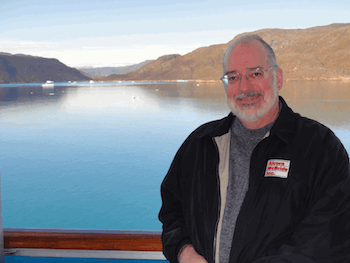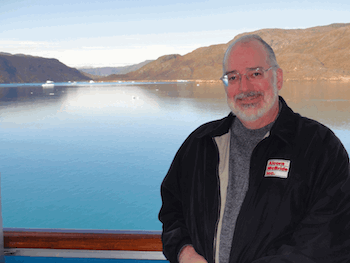by Kirsten Nelson
Alcorn McBride Founder Steve Alcorn Works at the Outer Limits of TechnologyFor a slide show of images from Steve Alcorn’s career, click here.
QUICK BIO
NAME: Steve Alcorn
TITLE: CEO
COMPANY: Alcorn McBride Inc.
OVERTIME: Steve Alcorn is an entrepreneur, engineer, inventor, author and teacher best known for his involvement in the theme park industry.
SCN:After receiving your degree in engineering from UCLA in 1977, you became an early pioneer of computer peripherals. As the notion of computers was changing at that time, what were your hopes and expectations for digital technology?
Steve Alcorn: In the 1970s, it was widely believed that it would never be possible to digitize a movie, because it would require terabytes of data to reproduce the resolution of film. One film would be bigger than the combined storage of every computer on Earth.
So we began with baby steps, designing the 360 Systems playback cards used to provide a few seconds of 8-bit sound for Epcot's Imagination pavilion. But just a decade later our Digital Binloop could provide a 24-channel half-hour soundtrack with no moving parts. It was quickly adopted by nearly every theme park, which led us to turn our attention to video. Now 4K is on the horizon, which means soon, with only solid-state storage, we'll be doing what we believed was impossible at the start of my career!
SCN:In 1982 you joined Walt Disney Imagineering as a consultant, where you worked on the electronic systems for Epcot Center. It's widely assumed that the sky was the limit when it came to Imagineering projects—how did this freedom influence innovation?
SA: In 1982, the money cannons were definitely loaded. Epcot was intended to be a technology showcase, so the art directors let their imaginations run wild, and it was our job to make it happen. Unfortunately, the scheduling people also let their imaginations run wild. In retrospect, what they wanted was nearly impossible, but they hired a bunch of kids just out of college who were too naive to know it wasn't normal to work 100-hour weeks, and who had something to prove. When I look back at how much technology we developed in just a couple of years—and in an era before the PC existed—it still amazes me.
For Epcot's 25th anniversary, David Green and I published a book about those days, called Building a Better Mouse. Fortunately, we wrote most of that book right after Epcot opened, so it captures the highly-caffeinated state we were in at the time. Otherwise, I wouldn't believe it myself.
SCN:In 1985 you became vice president of engineering and later COO for Linn Electronics, the inventors of the digital drum machine. What unique considerations must be made when approaching music technology design and engineering?
SA: Roger Linn is another Steve Jobs type of guy. He believes computers were made to serve man, not the other way around. I learned a tremendous amount about human interface design working with him. He believes that a product, no matter how complex, shouldn't require reading a manual to start using it. We try to apply those principles every day at Alcorn McBride. It makes a lot of extra work for our engineers, but I know our customers appreciate it.
Of course, it's easier to make intuitive audio/video and lighting products than show controllers, which are programmable. But our show control products aren't PCs; for obvious reliability reasons and virus protection they use custom embedded hardware. You program them using a script that's easy for non-engineers to understand. That makes them as easy to use as possible.
SCN:In 1986, 25 years ago, you founded Alcorn McBride. Your first show controller, the V16, was used in Wonders of Life at Epcot, and later became the standard throughout most of the world's theme parks. Your Digital Binloop multi-track audio system is also used in nearly every major theme park attraction. What qualities make a technology universal in this way?
SA: Three attributes have made us a standard: versatility, reliability, and support. Our products are like Swiss Army knives, with a tool for every job; even though their job is audio/video playback, it's the versatility of control that makes them unique. They have no moving parts, so their design lives exceed 20 years, with no maintenance. When you have a theme park with 3,000 channels of AV that's essential. And we're completely dedicated to customer support—our customers can speak to the engineer who designed their product. That's good for us, too, because it's where new product ideas come from.

